Saturday, October 14, 2006
"All aboard!"– for the first time since 1937
Chavez is inaugurating massive new public works so fast I can’t keep up. But the one that is now just hours away deserves special attention. On October 15th Venezuela will inaugurate its inter-city passenger rail service since 1937. Yes, you read right – since 1937!!
The new train is between Caracas and the satellite city of Valles del Tuy. It is the first step of what will be a large interconnected rail network criss-crossing Venezuela. In the map below it is the pinkish line going from Cua to Caracas.
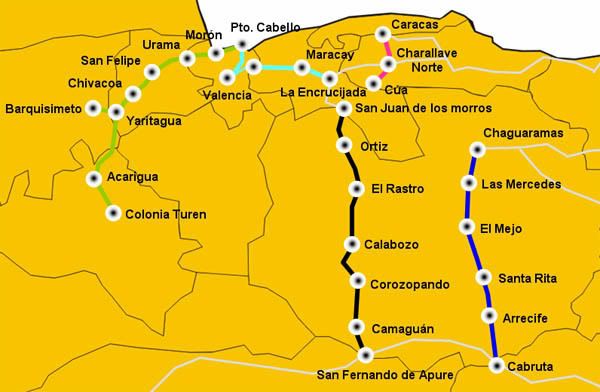
Other parts of the rail network, such as the line from Barquisimeto to Puetro Cabello are already well under construction.
Here is some more detailed information on the new train line:
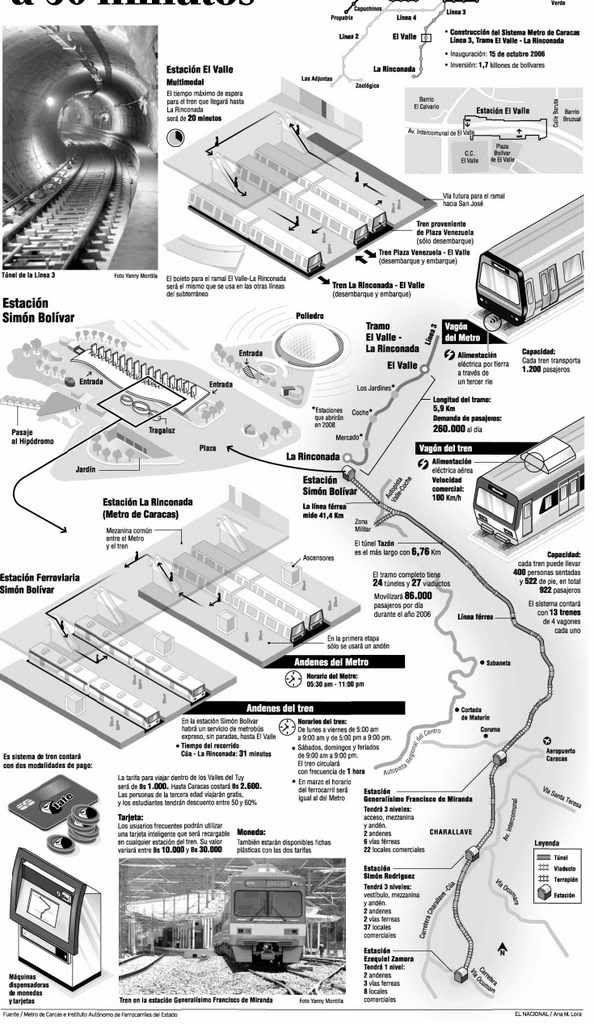
Now, the first thing to note is that Venezuela isn’t just going to be inaugurating a new rail line, Caracas will also be getting a significant addition to its subway system. The reason is that the governments prior to Chavez ran out of money and never finished the number 3 metro line which runs south from the center of Caracas. It was left to the Chavez government to complete it and it is now doing so.
Where the extended subway line ends, in a station called La Rinconada, is where the train will begin in a station called Simon Bolivar. From there the rain will travel 25 miles through very uneven train necessitating an amazing 24 tunnels and 27 bridges to its final destination of Tuy.
The subway extension is almost 4 miles long and will eventually have 4 new stations. However the 3 intermediate stations are not finished and so for the first subway will go from the old final station of El Valle to La Rinconada only. Here are some pictures of the new metro line:
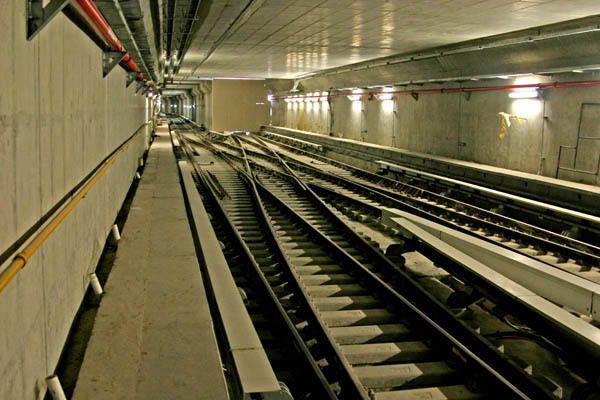
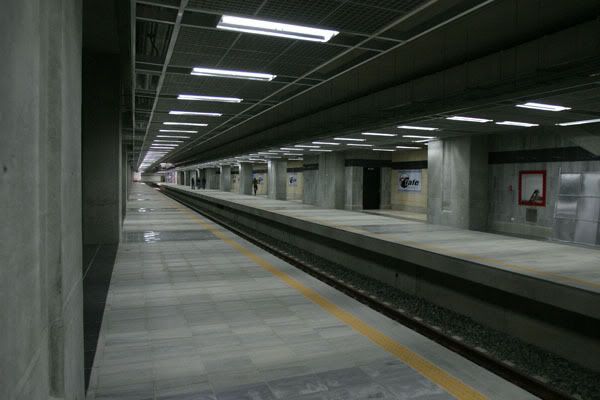
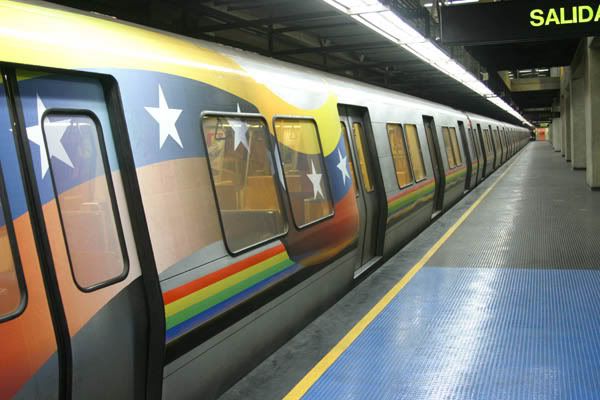
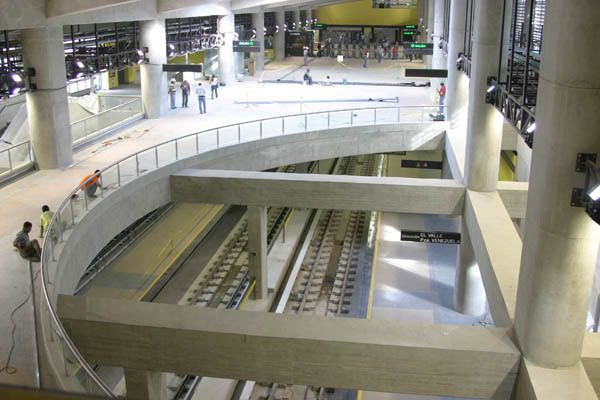
As for the new train, hopefully tomorrow we should have lots of pictures of the spiffy system. But here is a sneak pre-view showing some of the pictures from when it was under construction to up to the past few days when it was just having final touches:
First we see the station Simon Bolivar
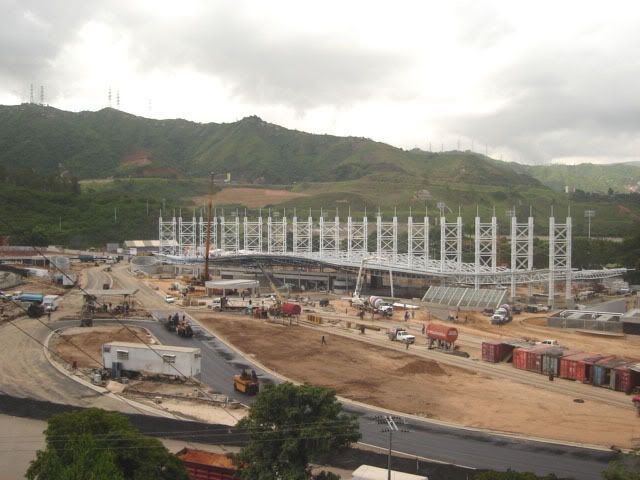
Under construction
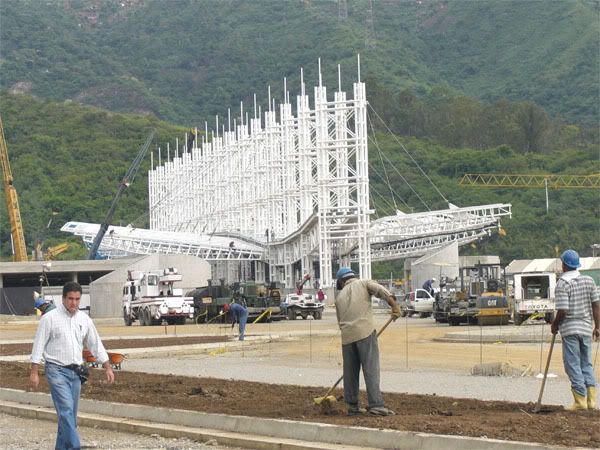
Almost done
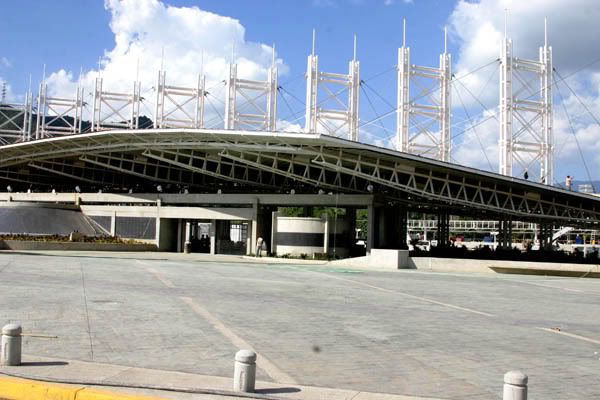
Waiting to be inaugurated.
Next are some of the intermediate stations:
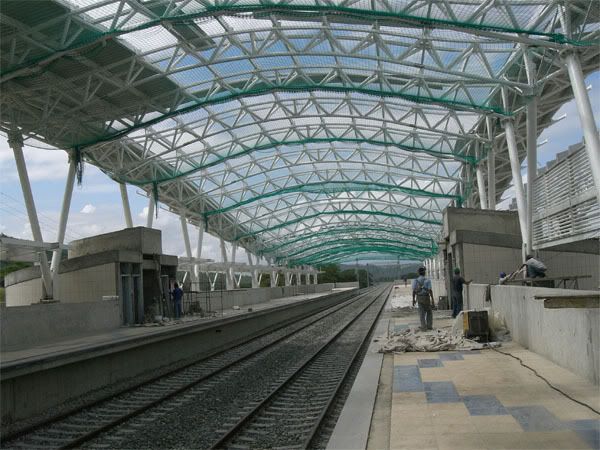
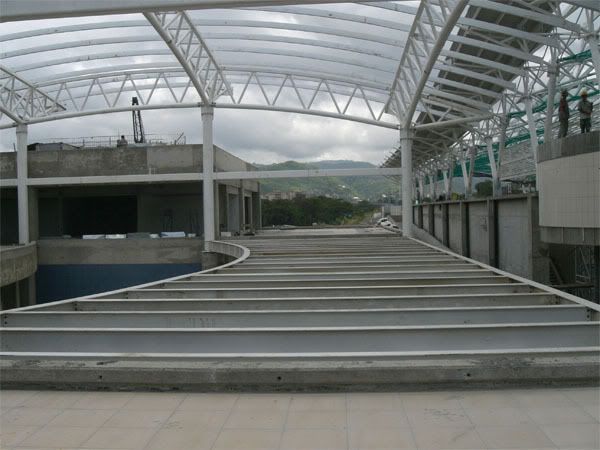
Charallava Sur

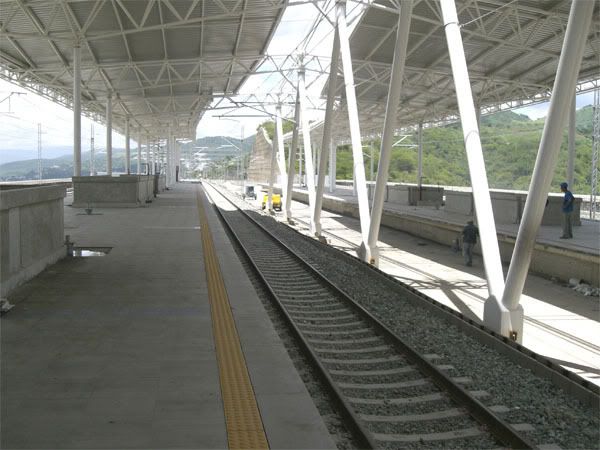
Charallava Norte
Two of the many bridges and tunnels:
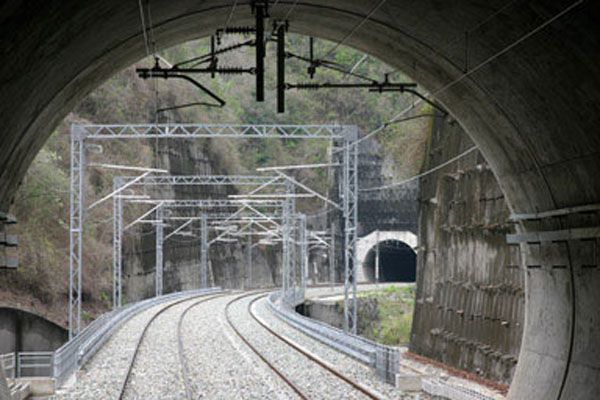
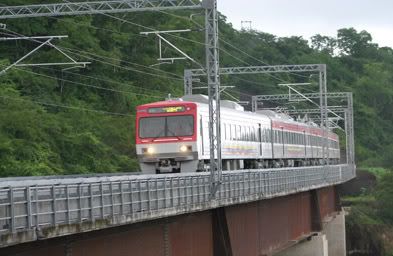
And lastly the trains themselves:
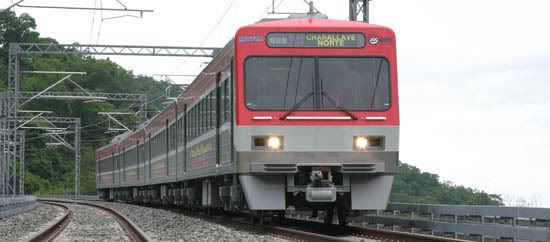
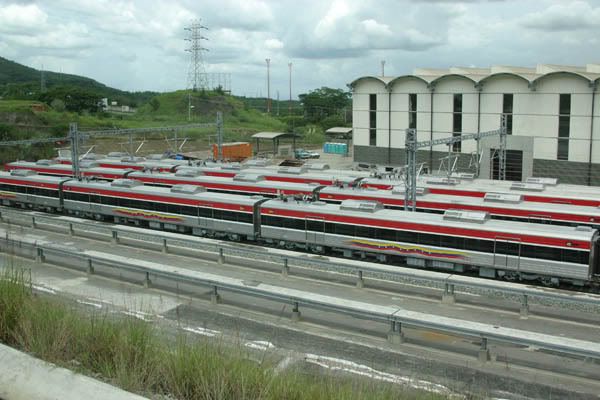
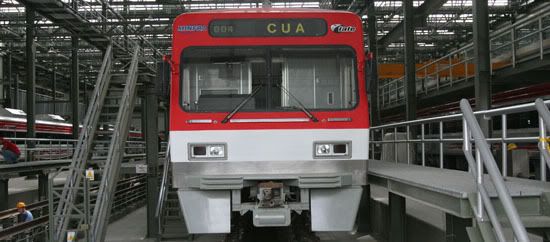
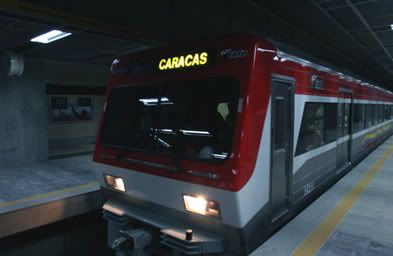
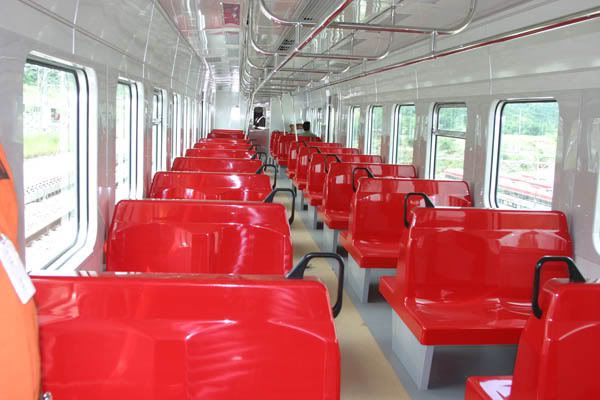
Only hours from now some lucky folks will be getting to ride these trains into Caracas and into history.
|
The new train is between Caracas and the satellite city of Valles del Tuy. It is the first step of what will be a large interconnected rail network criss-crossing Venezuela. In the map below it is the pinkish line going from Cua to Caracas.

Other parts of the rail network, such as the line from Barquisimeto to Puetro Cabello are already well under construction.
Here is some more detailed information on the new train line:

Now, the first thing to note is that Venezuela isn’t just going to be inaugurating a new rail line, Caracas will also be getting a significant addition to its subway system. The reason is that the governments prior to Chavez ran out of money and never finished the number 3 metro line which runs south from the center of Caracas. It was left to the Chavez government to complete it and it is now doing so.
Where the extended subway line ends, in a station called La Rinconada, is where the train will begin in a station called Simon Bolivar. From there the rain will travel 25 miles through very uneven train necessitating an amazing 24 tunnels and 27 bridges to its final destination of Tuy.
The subway extension is almost 4 miles long and will eventually have 4 new stations. However the 3 intermediate stations are not finished and so for the first subway will go from the old final station of El Valle to La Rinconada only. Here are some pictures of the new metro line:




As for the new train, hopefully tomorrow we should have lots of pictures of the spiffy system. But here is a sneak pre-view showing some of the pictures from when it was under construction to up to the past few days when it was just having final touches:
First we see the station Simon Bolivar

Under construction

Almost done

Waiting to be inaugurated.
Next are some of the intermediate stations:


Charallava Sur


Charallava Norte
Two of the many bridges and tunnels:


And lastly the trains themselves:





Only hours from now some lucky folks will be getting to ride these trains into Caracas and into history.
|
Full of Love, Chavez cruises along
It was noted with much fanfare that Chavez came out with some new campaign themes last week – notably his “Love” advertisements. The opposition has been unable to make heads or tails of these ads and view them as an act of desperation by Chavez. Lets have a look for ourselves:
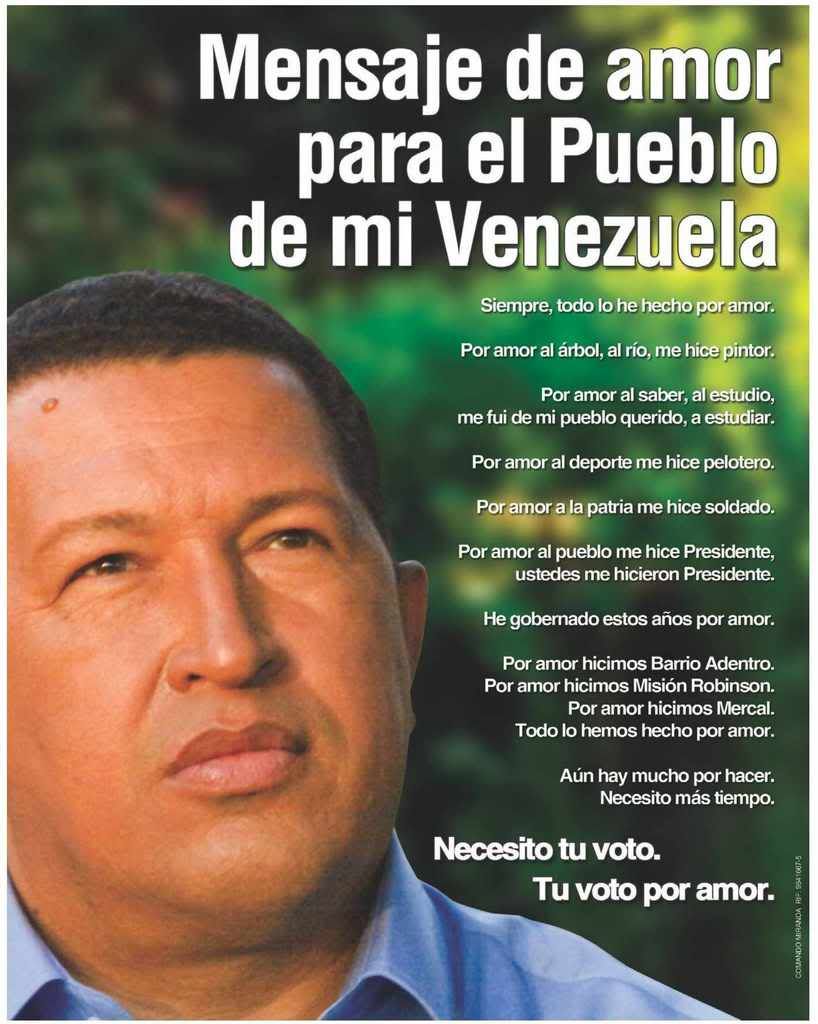
This is the print ad appearing in newspapers. It always appears with the same wording which is:
Here is the T.V. commercial where he gives the exact same message. It is worth watching:
I’m not sure what Chavez’s opponents are so confused about because the message in these advertisements seems crystal clear. The message is that everything that Chavez does is out of love; that is he doesn’t do anything that he doesn’t genuinely LOVE and WANT to do. Listing the main events of his live he shows how everything he ever did was something that he truly wanted to do. In a similar vain, everything he has done as President results from his genuine love of the Venezuelan people and he truly believes in everything he has done.
All that seems straightforward and nice but why build a campaign advertisement blitz around it? Simple. Right now his main opponent, Manuel Rosales, is trying to paint himself as someone who will do even MORE than what Chavez has to help ordinary Venezuelans. If some Venezuelans believe that then they may decide to vote for him.
To counter that the “Love” theme reinforces the notion that Chavez will continue to govern for the benefit of ordinary Venezuelans because he loves them and truly believes in the importance of helping them. The not so subtle inference is that Rosales DOESN’T truly care about ordinary Venezuelans and DOESN’T really even believe in all these new proposals he is touting.
Who would you vote for – someone who says what he believes and believes what he says or someone trying to sell you a bill of goods only to probably forget about you 5 minutes after the election is over? I think it is precisely that question that these advertisements want people to be thinking about as they vote on December. And I think they will be effective.
…………………………………………………
Irrespective of any new campaign advertising strategies Chavez’s march to re-election is moving forward without missing a beat. In the latest poll by Datos Chavez is holding steady with a “intention to vote for” of 54.4% with Manuel Rosales at 24.8%, Roussea bumping along the bottom at 2.7%, and 18.1% still undecided. In other words, Chavez has a lead of almost 30 points over his nearest rival. This even after Rosales has gotten a 6 point boost in his numbers from the 18% they were just a month ago.
The same poll showed that even many of Rosales supporters don’t really expect him to win. When asked who they thought would win, irrespective of their own preferences, 66.3% think Chavez will win while only 16% think Rosales will win.
When asked about their likelihood of voting 66.4% said they would definitely vote and 17.5% said they might vote with the rest saying most likely they won’t.
Just for fun I did some back of the envelope calculations. There are about 16 million registered voters in Venezuela. Assuming 70% actually vote that gives a turnout of 11.2 million voters. Further assuming Chavez gets 60% of the vote (ie, most of the undecided voters go to Rosales) that comes to 6.7 million votes for Chavez.
That certainly is a far cry from the famous slogan of “Ten million votes for Chavez”. Then again I always knew that wasn’t really a realistic goal. Still Chavez would probably like to get at least 7.5 to 8 million votes to make it harder to revoke his mandate three years from now. If he had done something over the past few years to eliminate some of the glaring failures of his government such as crime he would be shoe-in for 8 million votes but now it will be an uphill struggle to get them. We’ll see if the “Love” advertising theme helps.
|

This is the print ad appearing in newspapers. It always appears with the same wording which is:
Message of Love for the people of my Venezuela
Always, I have done things because of love.
Out of love for trees and rivers, I became a painter.
Out of love of learning, I left my beloved small town to study.
Out of love of sports, I became a baseball player.
Out of love for my homeland, I became a soldier.
Out of love for my people, I became president; all of you made me president.
I have governed these past 8 years out of love.
Out of love, we made “Barrio Adentro”
Out of love, we made “Mission Robinson”
Out of love, we made Mercal.
Everything we have done is because of love.
Yet there is still much to do.
I need more time.
I need your vote.
Your vote for love.
Here is the T.V. commercial where he gives the exact same message. It is worth watching:
I’m not sure what Chavez’s opponents are so confused about because the message in these advertisements seems crystal clear. The message is that everything that Chavez does is out of love; that is he doesn’t do anything that he doesn’t genuinely LOVE and WANT to do. Listing the main events of his live he shows how everything he ever did was something that he truly wanted to do. In a similar vain, everything he has done as President results from his genuine love of the Venezuelan people and he truly believes in everything he has done.
All that seems straightforward and nice but why build a campaign advertisement blitz around it? Simple. Right now his main opponent, Manuel Rosales, is trying to paint himself as someone who will do even MORE than what Chavez has to help ordinary Venezuelans. If some Venezuelans believe that then they may decide to vote for him.
To counter that the “Love” theme reinforces the notion that Chavez will continue to govern for the benefit of ordinary Venezuelans because he loves them and truly believes in the importance of helping them. The not so subtle inference is that Rosales DOESN’T truly care about ordinary Venezuelans and DOESN’T really even believe in all these new proposals he is touting.
Who would you vote for – someone who says what he believes and believes what he says or someone trying to sell you a bill of goods only to probably forget about you 5 minutes after the election is over? I think it is precisely that question that these advertisements want people to be thinking about as they vote on December. And I think they will be effective.
…………………………………………………
Irrespective of any new campaign advertising strategies Chavez’s march to re-election is moving forward without missing a beat. In the latest poll by Datos Chavez is holding steady with a “intention to vote for” of 54.4% with Manuel Rosales at 24.8%, Roussea bumping along the bottom at 2.7%, and 18.1% still undecided. In other words, Chavez has a lead of almost 30 points over his nearest rival. This even after Rosales has gotten a 6 point boost in his numbers from the 18% they were just a month ago.
The same poll showed that even many of Rosales supporters don’t really expect him to win. When asked who they thought would win, irrespective of their own preferences, 66.3% think Chavez will win while only 16% think Rosales will win.
When asked about their likelihood of voting 66.4% said they would definitely vote and 17.5% said they might vote with the rest saying most likely they won’t.
Just for fun I did some back of the envelope calculations. There are about 16 million registered voters in Venezuela. Assuming 70% actually vote that gives a turnout of 11.2 million voters. Further assuming Chavez gets 60% of the vote (ie, most of the undecided voters go to Rosales) that comes to 6.7 million votes for Chavez.
That certainly is a far cry from the famous slogan of “Ten million votes for Chavez”. Then again I always knew that wasn’t really a realistic goal. Still Chavez would probably like to get at least 7.5 to 8 million votes to make it harder to revoke his mandate three years from now. If he had done something over the past few years to eliminate some of the glaring failures of his government such as crime he would be shoe-in for 8 million votes but now it will be an uphill struggle to get them. We’ll see if the “Love” advertising theme helps.
|
Oil wars
Once in a while it is interesting to see that the name of this blog really is relevant to what is going on around us in the world today. I guess I may be a little behind on the news but I do need to thank President Bush in that respect for some clarifying comments he made last week:
Of course, the first part of that sentence in non-sense. There was no terrorism in Iraq, or really even eminating from it, until the U.S. invaded in 2003. Further, should the U.S. leave, its puppet regime fall, and some of the various insurgents in Iraq take over it is unlikely there would be any "terrorism" coming out of Iraq. The overwhelming majority of those fighting in Iraq are fighting for control of their own cities and towns, not so they can later blow up shopping malls in Kansas City.
But it is nice to see him come clean in the second half of the sentance - the U.S. won't "tolerate" states using large oil reserves funding "radical ambitions" or inflicting "economic damage on the West". So I guess if the "terrorist" state was in the middle of a desert or jungle and had no oil that would be ok. Once again we see it really is about oil - the ability oil has to magnify the power of countries and the ability it has to hurt the U.S. economy is something that is a key driver of U.S. foriegn policy.
The last thing the U.S. wants are countries that have hawkish pro-OPEC oil policies, use oil to stand up to the U.S., and even worse use oil to help others stand up to the U.S. And it is prepared to fight to keep that from happening in the Middle East.
Their willingness to spend hundreds of billions of dollars and thousands of lives fighting to make sure people they don't like in the Middle East don't get control over oil makes me think they are probably willing to at least spend a few tens of millions of dollars undermining other oil-rich governments, in their own hemisphere no less, they view as unfriendly. Some decades from now when the archives are opened it should be interesting to see all the assistance the Venezuelan oppoistion got courtesy the U.S. tax payer.
|
We can't tolerate a new terrorist state in the heart of the Middle East, with large oil reserves that could be used to fund its radical ambitions, or used to inflict economic damage on the West
Of course, the first part of that sentence in non-sense. There was no terrorism in Iraq, or really even eminating from it, until the U.S. invaded in 2003. Further, should the U.S. leave, its puppet regime fall, and some of the various insurgents in Iraq take over it is unlikely there would be any "terrorism" coming out of Iraq. The overwhelming majority of those fighting in Iraq are fighting for control of their own cities and towns, not so they can later blow up shopping malls in Kansas City.
But it is nice to see him come clean in the second half of the sentance - the U.S. won't "tolerate" states using large oil reserves funding "radical ambitions" or inflicting "economic damage on the West". So I guess if the "terrorist" state was in the middle of a desert or jungle and had no oil that would be ok. Once again we see it really is about oil - the ability oil has to magnify the power of countries and the ability it has to hurt the U.S. economy is something that is a key driver of U.S. foriegn policy.
The last thing the U.S. wants are countries that have hawkish pro-OPEC oil policies, use oil to stand up to the U.S., and even worse use oil to help others stand up to the U.S. And it is prepared to fight to keep that from happening in the Middle East.
Their willingness to spend hundreds of billions of dollars and thousands of lives fighting to make sure people they don't like in the Middle East don't get control over oil makes me think they are probably willing to at least spend a few tens of millions of dollars undermining other oil-rich governments, in their own hemisphere no less, they view as unfriendly. Some decades from now when the archives are opened it should be interesting to see all the assistance the Venezuelan oppoistion got courtesy the U.S. tax payer.
|
Wednesday, October 11, 2006
Can he really be that clueless?
It was previously reported that at the rally last Saturday opposition presidential candidate, Manuel Rosales, said Venezuelan oil production was 1.1 million barrels per day. That would be quite a stunning statement as Venezuelan oil production is definitely over 3 million barrels per day as has been pointed out so many times on this blog that I hardly think I even need to provide any links on it.
I thought he must have been misquoted or referring to something else as he couldn't have made such an egregious mistake. Today I found the video of what he said:
Unfortunately, he said exactly what I was afraid he said. Here is the exact quote on oil production:
Now, some have tried to make excuses for Rosales saying he is really referring to what the Venezuelan national oil company, PDVSA, produces or some such other sub-set of numbers. But that is clearly not the case. When he says Venezuela should be producing 3 million barrels per day of oil he clearly has to be talking about the country as a whole as that is what that number would correspond to. Plus, in plain spanish that is what he actually said - he specified "Venezuela" not PDVSA or some other entity.
Clearly this man who would hold himself up as the next President of Venezuela doesn't even know basic facts about what is far and away its most important industry (and to make matters worse he actually comes from one of the main oil producing regions of the country). As Venezuelan Energy Minister Rafael Ramirez said later on that tape it is simply stunning that he could be so poorly informed about something that is of such vital importance to Venezuela. I have to agree. I would expect any potential President of the United States to know things like what the population of the U.S. is, what the size of the Federal budget is, how much the deficit is, how many U.S. troops are in Iraq, and how long Social Security is expected to be solvent. Yet when commenting on a matter of similar importance to Venezuela this guy completely flubbed it. Not good. And I don't think any of his aides have even come out and corrected this by saying he just mispoke!
Moreover, some time ago Rosales said he was going to come out with the details of what his oil policy would be. I have been anxiously awaiting it but it has yet to come out. You would think that before you go off promising Venezuelan's the world with hugely expensive new programs you would make sure you have policies in place to help assure that you have the money to fund those programs. That they don't shows to me their lack of seriousness.
Suffice it to say though that these comments don't give me much confidence that the policy will be anything very good. Clearly it's hard to get oil policy right when you can't even get basic facts about the industry's current status correct. Furthermore, although his numbers were WAY off the statement seems to hint at the idea that Venezuela should be producing a lot more oil than it currently is. Given that the price of oil is heading downward due to the market being oversupplied I don't think that would be a good idea.
The opposition likes to trumpet Rosales as somehow being more "competant" than Chavez. If this statement is indicative of his level of "competance" that sure looks like nonsense. Fortunately, Venezuelan's needn't worry about when he goes back to his day job on December 4th as Zulia doesn't have its own oil policy.
|
I thought he must have been misquoted or referring to something else as he couldn't have made such an egregious mistake. Today I found the video of what he said:
Unfortunately, he said exactly what I was afraid he said. Here is the exact quote on oil production:
For example, Venezuela should be producing 3 million barrels per day of oil and it is only producing 1 million or 1.1 million barrels a day.
Now, some have tried to make excuses for Rosales saying he is really referring to what the Venezuelan national oil company, PDVSA, produces or some such other sub-set of numbers. But that is clearly not the case. When he says Venezuela should be producing 3 million barrels per day of oil he clearly has to be talking about the country as a whole as that is what that number would correspond to. Plus, in plain spanish that is what he actually said - he specified "Venezuela" not PDVSA or some other entity.
Clearly this man who would hold himself up as the next President of Venezuela doesn't even know basic facts about what is far and away its most important industry (and to make matters worse he actually comes from one of the main oil producing regions of the country). As Venezuelan Energy Minister Rafael Ramirez said later on that tape it is simply stunning that he could be so poorly informed about something that is of such vital importance to Venezuela. I have to agree. I would expect any potential President of the United States to know things like what the population of the U.S. is, what the size of the Federal budget is, how much the deficit is, how many U.S. troops are in Iraq, and how long Social Security is expected to be solvent. Yet when commenting on a matter of similar importance to Venezuela this guy completely flubbed it. Not good. And I don't think any of his aides have even come out and corrected this by saying he just mispoke!
Moreover, some time ago Rosales said he was going to come out with the details of what his oil policy would be. I have been anxiously awaiting it but it has yet to come out. You would think that before you go off promising Venezuelan's the world with hugely expensive new programs you would make sure you have policies in place to help assure that you have the money to fund those programs. That they don't shows to me their lack of seriousness.
Suffice it to say though that these comments don't give me much confidence that the policy will be anything very good. Clearly it's hard to get oil policy right when you can't even get basic facts about the industry's current status correct. Furthermore, although his numbers were WAY off the statement seems to hint at the idea that Venezuela should be producing a lot more oil than it currently is. Given that the price of oil is heading downward due to the market being oversupplied I don't think that would be a good idea.
The opposition likes to trumpet Rosales as somehow being more "competant" than Chavez. If this statement is indicative of his level of "competance" that sure looks like nonsense. Fortunately, Venezuelan's needn't worry about when he goes back to his day job on December 4th as Zulia doesn't have its own oil policy.
|
Monday, October 09, 2006
Look who’s a populist now
Over the past few weeks I’ve been trying to digest the news coming from the Rosales campaign and figure out what it is all about. I think I’ve now seen enough to draw some conclusions.
First let me detail some of the main proposals that have to date been put forth by Rosales. By far most famous of his plans is “Mi Negra” which is a plan to redistribute oil income directly to the Venezuelan about half of all Venezuelans.
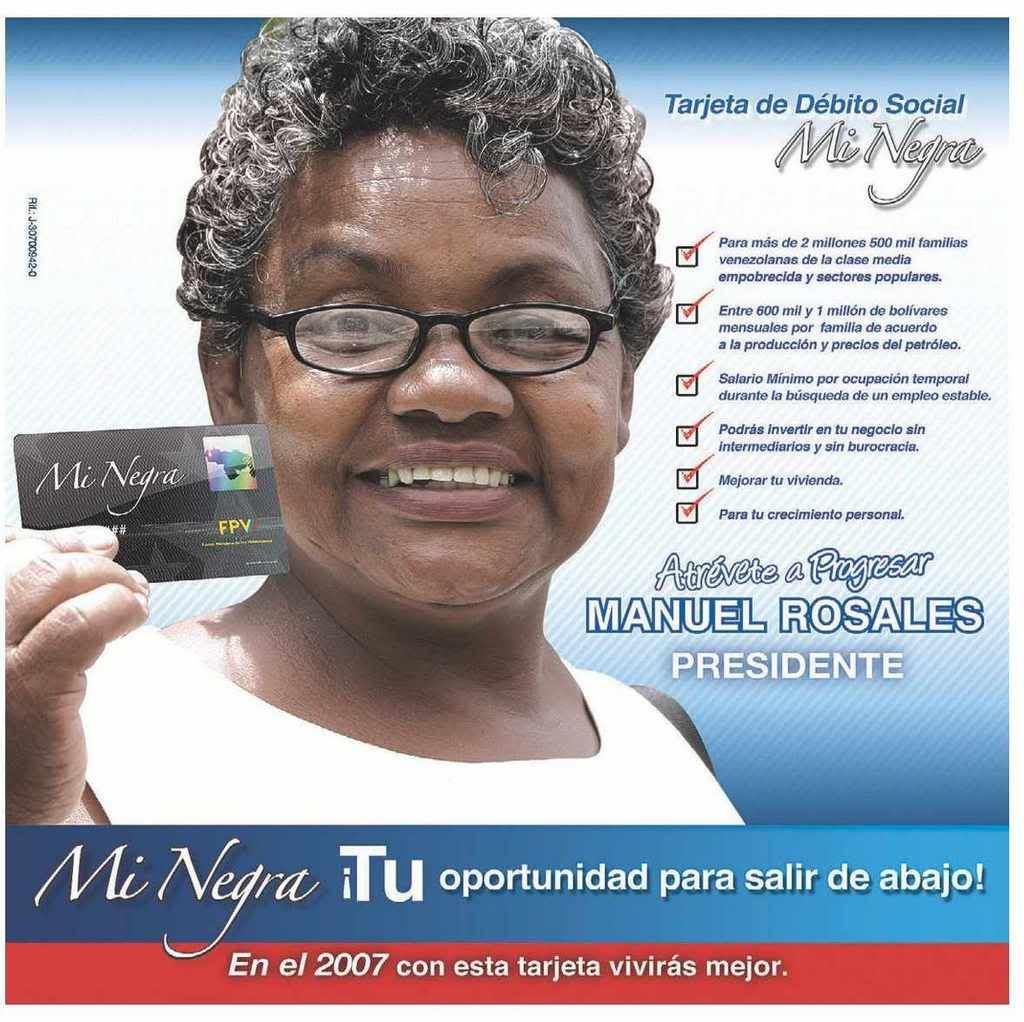
This is the ubiquitous advertisement for the “Mi Negra” program.
The plan aims to take a big chunk of Venezuela’s oil revenues and hand them out directly to people as a stipend of between $250 and $450 per month depending on oil revenues. This would be along the lines of what is called an “entitlement” in the United States. There would be nothing that the individuals getting this money would need to do. They wouldn’t have to work, go to school, make sure their kids go to school or anything else. All they would have to do is sit at home and wait for the money to show up.
Doing some back of the envelope calculations shows this program would cost at a minimum $7.5 billion per year and possibly up to twice that much.
And for a frame of reference the minimum wage in Venezuela (which is what most people who have jobs earn) is about $200 dollars per month or maybe a little more with benefits. If you are wondering if there would be anyone left working after the implementation of this program you are not alone. Yet without a doubt the “Mi Negra” idea is the idea that Rosales is pinning his hopes on for getting to Miraflores.
Later we saw that in his crime fighting proposals the money flowed just as easily. In addition to hiring hundreds of thousands of new police officers, prosecutors, and judges (and if you are wondering if Venezuela’s bloated government payroll really needs hundreds of thousands of more people on it again you are not alone) Rosales offered to pay over $2,000 for every gun turned in. Given that there are millions of guns floating around Venezuela that could turn out to be almost as costly as “Mi Negra”.
More recently, Rosales came out with his education plan which conformed to the developing pattern and called for huge government expenditures. In addition to giving free meals in all schools, free school supplies, and renovating schools (all things already being done to a large degree) it called for a massive new plan to put people left out of public universities into private universities all expenses paid by the government.
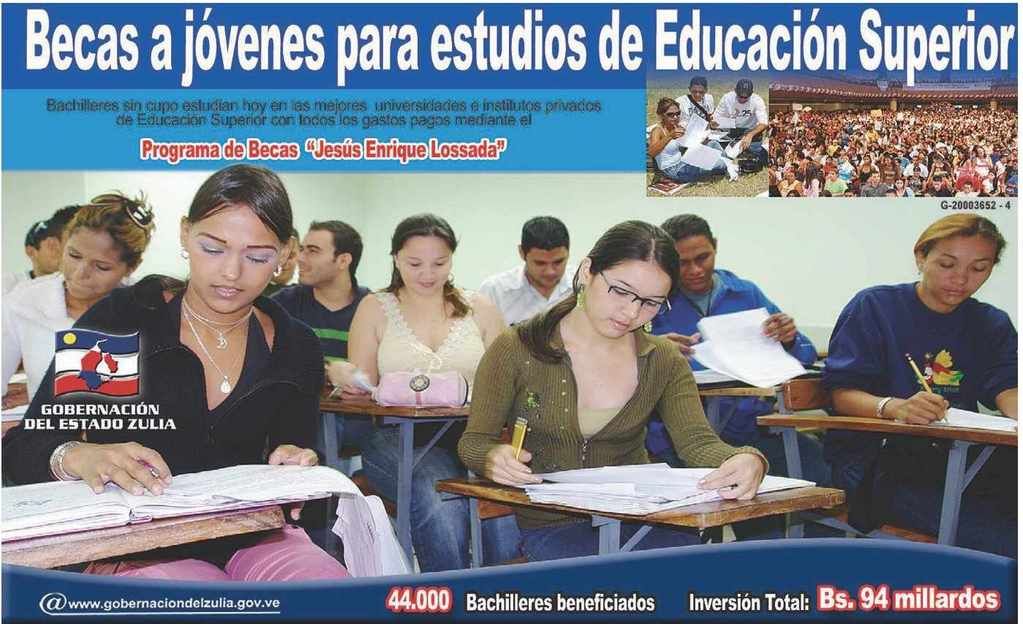
[as an interesting aside note this advertisement touting the same educational program as Rosales has put forth in his campaign appeared in newspapers courtesy the state of Zulia where Rosales was governor. Clearly the opposition has no problem skirting campaign laws]
So essentially the government would commit to giving everyone in the country a free education in a private university, no matter how expensive. Given that no numbers accompanied this proposal it’s hard to know how much it would cost but suffice it to say it would probably be quite expensive.
After looking at just a few of Rosales many proposals I think most people should be able to get the gist of it. The message of the Rosales campaign is “vote for me and I will give you money, in fact I will shower you with lots of money”. There is a term for this: populism.
For much of the past eight years the more serious critiques of Chavez have revolved around him being a populist, which, truth be told, to a large degree he is. Chavez has always campaigned around the idea of helping the poor get their fair share of Venezuela’s resources and helping improve their standard of living. As president he has governed in that way too, with a good deal of success as we have seen.
The opposition has always hammered away at those ideas and successes of Chavez by saying – “yes but it is all just redistributing oil rents not fomenting long term growth”, or “we don’t even know how effective the Missions are at teaching people anything”, or “Chavez is corrupting the country by making people look to the government for handouts”.
Now irrespective of the truthfulness of any of those statements what do we have in Rosales campaign promises? Handouts so huge they would make even the most committed populist blush. In the Chavez Missions one has to do something to get a stipend – learn to read and write, get a high school diploma, or earn a college degree. This didn’t spare them from criticism of just being handouts. Yet Rosales “Mi Negra” program would give out much MORE money and it would indisputably be a pure hand out – no need to work, study, read, write or anything. You would be perfectly free to sit around all day drink beer and watch TV, as would likely happen (actually with Rosales you might be able to double dip as he has vowed to also keep the Missions and even expand them!). And when you wanted to splurge on a trip to Margarita Island you could just sell a gun or two to the government and you would have all the money you could possibly need.
Whereas before some in the opposition talked about the need to develop other industries and have a competitive workforce now they have thrown that to the wind as there certainly aren’t many export oriented manufacturing businesses that would want to open in Venezuela when their potential employees would get paid more for just sitting around than they could offer to pay them for working. This is really the height of the rent seeking and petro-populism that up to two months ago the opposition was decrying.
On education the turnaround has been equally sharp. Whereas before the government was criticized for trying to jam to many ill-prepared students into universities now the opposition seems to think that is just fine and even more should be sent. No more talk about admission tests, if you want an expensive private education you deserve it and we’ll pay for it. Again, petro-populism in its purest form.
What the Rosales campaign has done here is a few things. First, clearly they are feeding off the recent oil revenue windfall to promise Venezuelan’s the world. With Rosales there is no mention of pain or sacrifice for a better future, just money, money, and more money. It simply takes ones breath away to see how fast all their Harvard, Oxford, and Yale learned economics goes out the window when it comes to winning power for themselves.
Second, they clearly think that by doing this they can somehow outflank Chavez on his left, or populist, side and steal away enough votes to win. Of all their miscalculations over the years this has to be the silliest and dumbest. Countless Venezuelan politicians have campaigned as populists only to quickly move to the right once they assume office. Carlos Andres Perez did it in 1989 famously brining about the huge Caracazo riots and Rafael Caldera did it in the mid 90s. A huge part of Chavez’s appeal is he campaigned from the left, and he has GOVERNED from the left. Any poor or working class person in Venezuela who wants the government to do as much as possible to help them sure knows who to vote for come December 3rd, Hugo Chavez.
One polling question could very quickly reveal the stupidity of what the opposition is doing if asked – “who do you think would care more about you and people like you once in office, Hugo Chavez or Manuel Rosales”. I’d be stunned if among the bottom half of Venezuelan society the answer wasn’t something like 80 – 20 in favor of Chavez. Which is of course why most of the polling firms will either never ask the question or never release the result.
Lastly, the idea has to be entertained that this is all a big lie – pure paja as Venezuelans would say. Maybe Rosales has no intention of doing any of these things, or doing them for more than a couple of years, if elected. It is just your typical bait-and-switch clap trap where they make all sorts of promises which are promptly forgotten about once in office. Honestly, I think this is quite possible.
But this too reveals their cynicism. By promising so much and then not delivering they are courting a social explosion. It also shows their lack of respect for the intelligence and memory of average Venezuelans – do they think your average person who has heard the opposition constantly bash the Missions for years now believes that that same opposition has now embraced them?
Whatever is the truth in all of this, whether they are truly new converts to the ideas of extreme populism or if this is all a big lie, the opposition is once again doing Venezuela a very big disservice. The reality is that with a three year long economic boom it is unlikely anyone with any program could defeat Chavez in an election.
Yet if the opposition truly had points that they believed in, points where their ideas on how best to take Venezuela forward diverge with Chavez’s, they could at least spend these many months of campaigning talking to people about what should be done to bring lasting prosperity to Venezuela. The least they could do is talk about all the ideas that up until a couple of months ago at least some of them professed to believe in.
Yes, they would still lose the election but anyone with their head screwed on straight knows that is a foregone conclusion anyways. But they could plant the seeds of some important ideas that in another time, under other conditions, could begin to grow and bear fruit. By doing this and by refusing to give in yet once again to the “immediatismo” that seems to govern everything they do they could be a REAL opposition with a real alternative to offer Venezuelans. And believe it or not that might even be appreciated by a lot of Chavez supporters who also know that Chavez isn’t the be all and end all for Venezuela.
Instead, Venezuelan’s on December 3rd will get to chose between two types of populism: the real one of Hugo Chavez and the almost certainly phony one of Manuel Rosales. It’s not hard to see which one they will choose. And once again the opposition will have let Venezuela down. With their insatiable lust for power and dollar signs in their eyes they really have nothing to offer Venezuela. Again they are leaving Hugo Chavez Frias as the only game in town.
|
First let me detail some of the main proposals that have to date been put forth by Rosales. By far most famous of his plans is “Mi Negra” which is a plan to redistribute oil income directly to the Venezuelan about half of all Venezuelans.

This is the ubiquitous advertisement for the “Mi Negra” program.
The plan aims to take a big chunk of Venezuela’s oil revenues and hand them out directly to people as a stipend of between $250 and $450 per month depending on oil revenues. This would be along the lines of what is called an “entitlement” in the United States. There would be nothing that the individuals getting this money would need to do. They wouldn’t have to work, go to school, make sure their kids go to school or anything else. All they would have to do is sit at home and wait for the money to show up.
Doing some back of the envelope calculations shows this program would cost at a minimum $7.5 billion per year and possibly up to twice that much.
And for a frame of reference the minimum wage in Venezuela (which is what most people who have jobs earn) is about $200 dollars per month or maybe a little more with benefits. If you are wondering if there would be anyone left working after the implementation of this program you are not alone. Yet without a doubt the “Mi Negra” idea is the idea that Rosales is pinning his hopes on for getting to Miraflores.
Later we saw that in his crime fighting proposals the money flowed just as easily. In addition to hiring hundreds of thousands of new police officers, prosecutors, and judges (and if you are wondering if Venezuela’s bloated government payroll really needs hundreds of thousands of more people on it again you are not alone) Rosales offered to pay over $2,000 for every gun turned in. Given that there are millions of guns floating around Venezuela that could turn out to be almost as costly as “Mi Negra”.
More recently, Rosales came out with his education plan which conformed to the developing pattern and called for huge government expenditures. In addition to giving free meals in all schools, free school supplies, and renovating schools (all things already being done to a large degree) it called for a massive new plan to put people left out of public universities into private universities all expenses paid by the government.

[as an interesting aside note this advertisement touting the same educational program as Rosales has put forth in his campaign appeared in newspapers courtesy the state of Zulia where Rosales was governor. Clearly the opposition has no problem skirting campaign laws]
So essentially the government would commit to giving everyone in the country a free education in a private university, no matter how expensive. Given that no numbers accompanied this proposal it’s hard to know how much it would cost but suffice it to say it would probably be quite expensive.
After looking at just a few of Rosales many proposals I think most people should be able to get the gist of it. The message of the Rosales campaign is “vote for me and I will give you money, in fact I will shower you with lots of money”. There is a term for this: populism.
For much of the past eight years the more serious critiques of Chavez have revolved around him being a populist, which, truth be told, to a large degree he is. Chavez has always campaigned around the idea of helping the poor get their fair share of Venezuela’s resources and helping improve their standard of living. As president he has governed in that way too, with a good deal of success as we have seen.
The opposition has always hammered away at those ideas and successes of Chavez by saying – “yes but it is all just redistributing oil rents not fomenting long term growth”, or “we don’t even know how effective the Missions are at teaching people anything”, or “Chavez is corrupting the country by making people look to the government for handouts”.
Now irrespective of the truthfulness of any of those statements what do we have in Rosales campaign promises? Handouts so huge they would make even the most committed populist blush. In the Chavez Missions one has to do something to get a stipend – learn to read and write, get a high school diploma, or earn a college degree. This didn’t spare them from criticism of just being handouts. Yet Rosales “Mi Negra” program would give out much MORE money and it would indisputably be a pure hand out – no need to work, study, read, write or anything. You would be perfectly free to sit around all day drink beer and watch TV, as would likely happen (actually with Rosales you might be able to double dip as he has vowed to also keep the Missions and even expand them!). And when you wanted to splurge on a trip to Margarita Island you could just sell a gun or two to the government and you would have all the money you could possibly need.
Whereas before some in the opposition talked about the need to develop other industries and have a competitive workforce now they have thrown that to the wind as there certainly aren’t many export oriented manufacturing businesses that would want to open in Venezuela when their potential employees would get paid more for just sitting around than they could offer to pay them for working. This is really the height of the rent seeking and petro-populism that up to two months ago the opposition was decrying.
On education the turnaround has been equally sharp. Whereas before the government was criticized for trying to jam to many ill-prepared students into universities now the opposition seems to think that is just fine and even more should be sent. No more talk about admission tests, if you want an expensive private education you deserve it and we’ll pay for it. Again, petro-populism in its purest form.
What the Rosales campaign has done here is a few things. First, clearly they are feeding off the recent oil revenue windfall to promise Venezuelan’s the world. With Rosales there is no mention of pain or sacrifice for a better future, just money, money, and more money. It simply takes ones breath away to see how fast all their Harvard, Oxford, and Yale learned economics goes out the window when it comes to winning power for themselves.
Second, they clearly think that by doing this they can somehow outflank Chavez on his left, or populist, side and steal away enough votes to win. Of all their miscalculations over the years this has to be the silliest and dumbest. Countless Venezuelan politicians have campaigned as populists only to quickly move to the right once they assume office. Carlos Andres Perez did it in 1989 famously brining about the huge Caracazo riots and Rafael Caldera did it in the mid 90s. A huge part of Chavez’s appeal is he campaigned from the left, and he has GOVERNED from the left. Any poor or working class person in Venezuela who wants the government to do as much as possible to help them sure knows who to vote for come December 3rd, Hugo Chavez.
One polling question could very quickly reveal the stupidity of what the opposition is doing if asked – “who do you think would care more about you and people like you once in office, Hugo Chavez or Manuel Rosales”. I’d be stunned if among the bottom half of Venezuelan society the answer wasn’t something like 80 – 20 in favor of Chavez. Which is of course why most of the polling firms will either never ask the question or never release the result.
Lastly, the idea has to be entertained that this is all a big lie – pure paja as Venezuelans would say. Maybe Rosales has no intention of doing any of these things, or doing them for more than a couple of years, if elected. It is just your typical bait-and-switch clap trap where they make all sorts of promises which are promptly forgotten about once in office. Honestly, I think this is quite possible.
But this too reveals their cynicism. By promising so much and then not delivering they are courting a social explosion. It also shows their lack of respect for the intelligence and memory of average Venezuelans – do they think your average person who has heard the opposition constantly bash the Missions for years now believes that that same opposition has now embraced them?
Whatever is the truth in all of this, whether they are truly new converts to the ideas of extreme populism or if this is all a big lie, the opposition is once again doing Venezuela a very big disservice. The reality is that with a three year long economic boom it is unlikely anyone with any program could defeat Chavez in an election.
Yet if the opposition truly had points that they believed in, points where their ideas on how best to take Venezuela forward diverge with Chavez’s, they could at least spend these many months of campaigning talking to people about what should be done to bring lasting prosperity to Venezuela. The least they could do is talk about all the ideas that up until a couple of months ago at least some of them professed to believe in.
Yes, they would still lose the election but anyone with their head screwed on straight knows that is a foregone conclusion anyways. But they could plant the seeds of some important ideas that in another time, under other conditions, could begin to grow and bear fruit. By doing this and by refusing to give in yet once again to the “immediatismo” that seems to govern everything they do they could be a REAL opposition with a real alternative to offer Venezuelans. And believe it or not that might even be appreciated by a lot of Chavez supporters who also know that Chavez isn’t the be all and end all for Venezuela.
Instead, Venezuelan’s on December 3rd will get to chose between two types of populism: the real one of Hugo Chavez and the almost certainly phony one of Manuel Rosales. It’s not hard to see which one they will choose. And once again the opposition will have let Venezuela down. With their insatiable lust for power and dollar signs in their eyes they really have nothing to offer Venezuela. Again they are leaving Hugo Chavez Frias as the only game in town.
|
Sunday, October 08, 2006
Watch out for the “Avalanche”
Observers of Venezuela might have noticed that recently the term “avalanche” has been popping up all over the place. The opposition used it to refer to their march yesterday – as in there were a lot of people there. In fact they have been using the term quite a bit.
Truth be told, though, the term isn’t one that really suits them. The reason being that what favors them are small groups of people, not large groups. There is a very simple reason for this. They represent Venezuela’s elite and parts of the middle class. As a result their political base is small – maybe about 25% of the Venezuelan population.
Does that mean they can never win an election? No, it doesn’t. That minority can win because generally a much higher proportion of them vote than of the remaining 75% who constitute Chavez’s political base. The electoral silence and complacency of the poor greatly favors the upper classes and, along with their monetary resources, allows them to influence the political system in a way far beyond their numbers.
This explains, for example, why the opposition has complained bitterly about the Chavez administration registering millions of new voters. They know that it is much better for them if those millions of poor Venezuelans stay unregistered and don’t participate come election day.
How do I know they think that way? Truthfully, from all their actions over the past few years there isn’t much doubt. But I also know it because they say it so unequivocally themselves as the following video shows. This is a tape of Enrique Mendoza, the leader of the effort to recall President Chavez, speaking to his advisers on the night before the Recall Referendum on August 2004:
So there you have the opposition saying very clearly that “what really worries me is massive voting” and “abstention helps us”. Finally he sums it up very succinctly – “An avalanche can be very dangerous for us”.
Personally, I think there is something fundamentally undemocratic about wanting millions of your fellow citizens not to vote in order for you to have a chance to win.
BTW, the above video clip comes from the documentary called “Venezuela – Revolution in Progress” made by Downtown Community Television. It focuses on the Recall Referendum and follows activists from both sides around to give a very balanced, and informative, perspective. It is has been shown on the Discovery Times Channel and I recommend that people interested in those events consider purchasing it.
|
Truth be told, though, the term isn’t one that really suits them. The reason being that what favors them are small groups of people, not large groups. There is a very simple reason for this. They represent Venezuela’s elite and parts of the middle class. As a result their political base is small – maybe about 25% of the Venezuelan population.
Does that mean they can never win an election? No, it doesn’t. That minority can win because generally a much higher proportion of them vote than of the remaining 75% who constitute Chavez’s political base. The electoral silence and complacency of the poor greatly favors the upper classes and, along with their monetary resources, allows them to influence the political system in a way far beyond their numbers.
This explains, for example, why the opposition has complained bitterly about the Chavez administration registering millions of new voters. They know that it is much better for them if those millions of poor Venezuelans stay unregistered and don’t participate come election day.
How do I know they think that way? Truthfully, from all their actions over the past few years there isn’t much doubt. But I also know it because they say it so unequivocally themselves as the following video shows. This is a tape of Enrique Mendoza, the leader of the effort to recall President Chavez, speaking to his advisers on the night before the Recall Referendum on August 2004:
So there you have the opposition saying very clearly that “what really worries me is massive voting” and “abstention helps us”. Finally he sums it up very succinctly – “An avalanche can be very dangerous for us”.
Personally, I think there is something fundamentally undemocratic about wanting millions of your fellow citizens not to vote in order for you to have a chance to win.
BTW, the above video clip comes from the documentary called “Venezuela – Revolution in Progress” made by Downtown Community Television. It focuses on the Recall Referendum and follows activists from both sides around to give a very balanced, and informative, perspective. It is has been shown on the Discovery Times Channel and I recommend that people interested in those events consider purchasing it.
|
